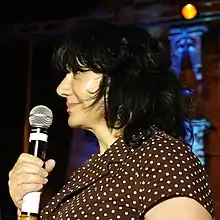Salwa Al Neimi
Salwa Al Neimi, also Salwa al-Nuʿaymī (Arabic: سلوى النعيمي) is a Syrian writer, poet and journalist living in France. Originally from Damascus, she is known for her outspoken views on topics which are taboo in the Islamic world, particularly female sexuality. In 2007 she published her debut novel, The Proof of the Honey, which was noted for its female sexual liberalization.

Background
Al Neimi studied at the University of Damascus in 1975 and subsequently at Paris-Sorbonne University in Paris where she received a post-master's degree in Arabic literature. She commenced work as a journalist, and her interviews of several prominent Arab and Western writers were published in Arabic journals such as Al-Karmel, Masharef and Kull al-ʿArab. In 1997 she was appointed chief press secretary of the Arab World Institute in Paris.[1]
Works
Notable works include the poetry collections Dhahaba alladhīna uḥibbuhum (The Ones I Love Passed Away), published in 1999, and Ajdādī al-qatalah (My Ancestors, the Assassins) published in 2001, both of which explore women fighting tradition in the Islamic world. In 2007 she published her debut novel, Burhān al-ʿasal (The Proof of the Honey), which sold well internationally due to its liberal discussion of female sexuality and erotic language.[1][2] Al Neimi stated in a 2009 interview that the sexual freedom of the narrator is "the result of invoking Arab and Muslim heritage". This was followed by 2012's Shibh al-Jazīrah al-ʿArabiyyah (The Arabian Peninsula), a semiautobiographical account of her earlier life with her Christian mother and a Muslim father.[1] Al Neimi has also published a collection of short stories.[3]
References
- "Salwa Al Neimi". Encyclopedia Britannica. Retrieved 10 November 2017.
- Hanadi Al-Samman (2 December 2015). Anxiety of Erasure: Trauma, Authorship, and the Diaspora in Arab Women's Writings. Syracuse University Press. ISBN 9780815653295. Retrieved 10 November 2017.
- "Salwa Al-Neimi". Poetry Foundation. Retrieved 10 November 2017.